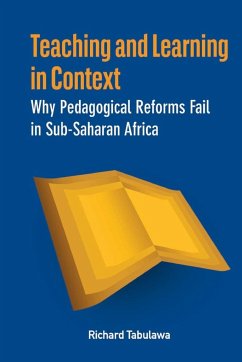
Teaching and Learning in Context. Why Pedagogical Reforms Fail in Sub-Saharan Africa
Versandkostenfrei!
Versandfertig in 1-2 Wochen
41,99 €
inkl. MwSt.

PAYBACK Punkte
21 °P sammeln!
Since the 1990s, sub-Saharan Africa has experienced unprecedented attempts at reforming teacher and student classroom practices, with a learner-centred pedagogy regarded as an effective antidote to the prevalence of teacher-centred didactic classroom practices. Attempts at reform have been going on all over the continent. In fact, learner-centred pedagogy has been described as one of the most pervasive educational ideas in contemporary sub-Saharan Africa and elsewhere. Research has revealed that the major attempts have largely failed mainly because teachers have not been able to adopt instruct...
Since the 1990s, sub-Saharan Africa has experienced unprecedented attempts at reforming teacher and student classroom practices, with a learner-centred pedagogy regarded as an effective antidote to the prevalence of teacher-centred didactic classroom practices. Attempts at reform have been going on all over the continent. In fact, learner-centred pedagogy has been described as one of the most pervasive educational ideas in contemporary sub-Saharan Africa and elsewhere. Research has revealed that the major attempts have largely failed mainly because teachers have not been able to adopt instructional innovations to technical problems. This failure is also related to lack of resources, and poor teacher training programmes which lead to poor teacher quality, among others. This book attempts to explain why pedagogical change has not occurred in spite of the much energy and resources that have been committed to such reforms.The book also takes us inside what the author calls 'the socio-cultural world of African classrooms' to help us understand the reasons teachers dominate classroom life and rely disproportionately on didactic methods of teaching. Its conceptual analyses capture the best of both the sociology and the anthropology of education in contexts of poverty, as well as the politics of education.The book concludes that a socio-cultural approach should be the basis for developing culturally responsive indigenous pedagogies, though these may or may not turn out to be in any way akin to constructivist learner-centred pedagogies.














